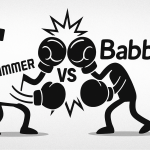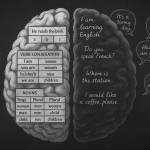Choosing a language learning app is easy if all you want is a few words a day. But if your goal is passing an official certificate exam – DELE, DELF, Goethe, Cambridge, or CEFR-aligned levels like B2 and C1 – the choice becomes more serious. Some apps build habits but stop short of exam skills. Others offer grammar depth but miss out on speaking and listening. And then there are platforms designed from the ground up to prepare you for high-stakes testing.
This article compares six of the biggest names – Taalhammer, Duolingo, Busuu, Babbel, Quizlet, and Memrise – specifically through the lens of certificate readiness. We’ll look at grammar depth, CEFR alignment, vocabulary, pronunciation, and practice tasks, then decide which app really prepares you to pass.
- Taalhammer: Science-Based Exam Preparation
- Taalhammer vs Duolingo: Which App Prepares You Better for Certificates?
- Taalhammer vs Busuu: Certificates and CEFR Alignment Compared
- Taalhammer vs Babbel: Grammar Depth vs Classroom Structure
- Taalhammer vs Quizlet: Active Recall vs Flashcards
- Taalhammer vs Memrise: Pronunciation and Vocabulary for Exams
- Language Learning App Comparison: Which App Helps You Pass Certificates Best?
- FAQs About Best Language Learning App and Certificates
Taalhammer: Science-Based Exam Preparation
Among all the apps, Taalhammer positions itself most directly as a certificate-ready platform. Unlike gamified apps that emphasize streaks, Taalhammer focuses on sentence-based spaced repetition (SRS). Instead of drilling isolated words, learners repeatedly recall full sentences, which builds both vocabulary and grammar in context.
The app is also aligned with CEFR levels and tracks user progress across them. This means learners can see whether they are stabilizing at B1 or moving into B2, with adaptive reviews targeting weak areas until they stick. This kind of precision matters when preparing for exams, where accuracy is just as important as fluency.
Another strength is pronunciation and listening. Every sentence comes with native audio and IPA, and the app provides pronunciation feedback through AI recognition. For oral exam sections, this means you don’t just memorize – you practice sounding natural.
For writing and speaking preparation, Taalhammer integrates prompts similar to exam tasks. Instead of filling blanks, you might be asked to produce full answers like “If I had more time, I would study Spanish every day.” That’s exactly the type of language required in a B2 or C1 exam.
In short: Taalhammer is less about fun mascots and more about scientific learning that prepares you to perform under exam conditions.
Want to know which apps are really grounded in learning science? Read Best Language Learning Apps Based on Science in 2025: Taalhammer vs Duolingo, Babbel and 8 More.
Taalhammer vs Duolingo: Which App Prepares You Better for Certificates?
Duolingo is by far the most popular language app in the world. Its strength lies in gamification: streaks, badges, leaderboards, and micro-lessons keep learners motivated. For casual learners, it works brilliantly. But does that translate into certificate exam readiness?
- Content focus: Duolingo teaches words and short sentences through drills and translation exercises. Taalhammer builds whole sentences tied to grammar structures.
- Exam preparation: Duolingo does not simulate exam tasks. It offers a proprietary Duolingo English Test (DET), but that’s separate from CEFR-based certificates. Taalhammer aligns content with CEFR levels directly.
- Grammar depth: Duolingo keeps grammar implicit with short “tips.” Taalhammer integrates grammar into practice and reinforces it through recall.
- Pronunciation: Duolingo speech recognition is basic, marking whether something was “understood.” Taalhammer provides IPA, native audio, and targeted feedback.
Table: Taalhammer vs Duolingo for Certificate Readiness
| Feature | Taalhammer | Duolingo |
|---|---|---|
| CEFR Alignment | Yes, explicit tracking across levels | Partial, approximate in major courses |
| Grammar Depth | Embedded in sentence practice + notes | Limited, short “tips” |
| Vocabulary Practice | Whole-sentence recall, adaptive SRS | Word/phrase drills, gamified |
| Speaking/Pronunciation | Native audio, IPA, AI feedback | Basic speech recognition |
| Exam-Style Tasks | Yes (roleplay prompts, extended output) | No direct simulation |
| Certificate Focus | B2/C1 exam readiness | Gamification + DET (not CEFR exams) |
Verdict: Duolingo builds habits; Taalhammer builds exam skills. Learners who want to pass B2 or C1 should treat Duolingo as a motivational supplement, not as a standalone prep tool.
For a closer look at the strengths and weaknesses of each platform, see Taalhammer vs Duolingo: Which Language App Is Actually Better for Learning and for Whom?.
Taalhammer vs Busuu: Certificates and CEFR Alignment Compared
Busuu is known for its community-driven corrections and CEFR-aligned courses (A1–B2). It even partners with McGraw-Hill to issue certificates for course completion. This makes it more exam-oriented than apps like Duolingo, but the question is: does it actually prepare learners for official certificates such as Goethe, DELF, or Cambridge?
- Content focus: Busuu structures lessons around dialogues and short tasks. Taalhammer builds adaptive sentence collections that recycle exam-level grammar and vocabulary until they are mastered.
- Exam preparation: Busuu provides certificate of completion, but this is not the same as a CEFR exam. Taalhammer explicitly trains for CEFR descriptors, with prompts close to exam conditions.
- Grammar depth: Busuu combines short explanations with practice. Taalhammer embeds grammar more consistently through full-sentence recall, which leads to higher accuracy under test conditions.
- Pronunciation: Busuu includes native recordings and lets users submit speech to peers for corrections. Taalhammer supplements native audio with IPA and AI-driven feedback, which is more systematic.
Table: Taalhammer vs Busuu for Certificate Readiness
| Feature | Taalhammer | Busuu |
|---|---|---|
| CEFR Alignment | Full, adaptive tracking across A1–C1 | A1–B2 structured courses, no C1/C2 |
| Grammar Depth | High, embedded in sentences | Moderate, with explicit notes |
| Vocabulary Practice | Sentence-based recall, adaptive SRS | Word/phrase practice, dialogue context |
| Speaking/Pronunciation | Native audio, IPA, AI feedback | Native audio + peer corrections |
| Exam-Style Tasks | Yes, roleplay + extended responses | Limited to short prompts |
| Certificate Focus | CEFR readiness (B2/C1) | McGraw-Hill course certificate (not CEFR exam) |
Verdict: Busuu provides structure and peer feedback, but stops at B2 and relies on community corrections. Taalhammer prepares directly for CEFR exams, with more reliable grammar reinforcement and adaptive recall for higher levels.
Taalhammer vs Babbel: Grammar Depth vs Classroom Structure
Babbel positions itself as the most classroom-like app on the market. Lessons follow a linear, CEFR-based progression with dialogues, grammar notes, and short practice drills. It’s more structured than Duolingo or Memrise, which makes it attractive for learners who prefer clear explanations. But how does it compare to Taalhammer when it comes to certificate exam preparation?
- Content focus: Babbel uses dialogues to introduce new grammar and vocabulary, followed by translation and fill-in-the-blank tasks. Taalhammer instead forces active recall of whole sentences, reinforcing grammar and vocabulary together until learners can produce exam-level responses.
- Exam preparation: Babbel’s lessons cover CEFR levels up to C1 in some languages, which is useful for exam alignment. However, it does not provide exam-style prompts or extended writing/speaking practice. Taalhammer integrates exam-like prompts into its recall system.
- Grammar depth: Babbel explains grammar explicitly and in detail. Taalhammer embeds grammar directly into practice, with short notes when needed – a more efficient way to internalize rules for exams.
- Pronunciation: Both apps use native speaker recordings. Babbel adds speech recognition but offers limited feedback. Taalhammer offers IPA, detailed phonetic cues, and AI-driven analysis, which is stronger for oral exam readiness.
Table: Taalhammer vs Babbel for Certificate Readiness
| Feature | Taalhammer | Babbel |
|---|---|---|
| CEFR Alignment | Yes, adaptive from A1–C1 | A1–C1 in some languages |
| Grammar Depth | High, embedded in full-sentence recall | Strong, explicit explanations |
| Vocabulary Practice | Adaptive, contextual SRS | Dialogue-based, controlled input |
| Speaking/Pronunciation | Native audio, IPA, AI feedback | Native audio + basic speech recognition |
| Exam-Style Tasks | Integrated roleplay + extended answers | No, focuses on drills and dialogues |
| Certificate Focus | Explicitly builds B2/C1 exam readiness | CEFR-aligned but lacks exam simulation |
Verdict: Babbel gives clear grammar explanations and structured lessons, which is reassuring for learners. But Taalhammer goes further by training recall, accuracy, and exam-style responses – the skills that certificates actually test.
Taalhammer vs Quizlet: Active Recall vs Flashcards
Quizlet is one of the world’s most popular study tools, but it isn’t a full language learning app. Its power lies in flashcards and spaced repetition, which help learners memorize vocabulary quickly. For exam prep, that can be valuable – but does it match what Taalhammer offers?
- Content focus: Quizlet is flexible. Learners or teachers create sets, often including exam-specific vocabulary. Taalhammer, by contrast, provides curated, sentence-based collections that follow CEFR descriptors and exam tasks.
- Exam preparation: Quizlet helps with memorization of terms but does not train integrated skills like writing, speaking, or comprehension. Taalhammer’s sentence recall forces learners to produce language in the same way exam prompts require.
- Grammar depth: Quizlet does not teach grammar unless users create grammar flashcards. Taalhammer embeds grammar into every practice session and reinforces it through adaptive reviews.
- Pronunciation: Quizlet provides audio (mostly text-to-speech) but no feedback. Taalhammer uses native audio, IPA, and AI-driven pronunciation analysis.
Table: Taalhammer vs Quizlet for Certificate Readiness
| Feature | Taalhammer | Quizlet |
|---|---|---|
| CEFR Alignment | Yes, adaptive from A1–C1 | None; depends on user-created sets |
| Grammar Depth | High, embedded in sentences | None unless user adds grammar cards |
| Vocabulary Practice | Adaptive recall with full sentences | Strong, flashcards + spaced repetition |
| Speaking/Pronunciation | Native audio, IPA, AI feedback | Audio only, limited quality |
| Exam-Style Tasks | Yes, roleplay + extended prompts | No, focused on drills |
| Certificate Focus | Direct CEFR exam readiness | Supplementary, not standalone |
Verdict: Quizlet is good as a vocabulary supplement, especially for learners who want to create or share exam word lists (although Taalhammer allows you to do that also). But it cannot replace a structured system like Taalhammer, which builds grammar, fluency, and exam-style performance.
You can read more about these two apps head-to-head in Taalhammer vs Quizlet: Which language learning app is truly science-based?.
Taalhammer vs Memrise: Pronunciation and Vocabulary for Exams
Memrise built its reputation on mnemonics and short native-speaker video clips. Learners get exposure to authentic speech and everyday phrases, which can be motivating and fun. But when the goal is certificate exam preparation, does vocabulary-heavy input go far enough?
- Content focus: Memrise emphasizes vocabulary acquisition through repetition and video clips of real speakers. Taalhammer builds entire sentences tied to grammar and CEFR descriptors, targeting not just recognition but production – a key exam requirement.
- Exam preparation: Memrise improves listening and vocabulary range, useful for the receptive skills in exams. But it does not simulate exam tasks or train extended writing/speaking. Taalhammer integrates prompts that mirror oral and written exam tasks, building active exam performance.
- Grammar depth: Memrise does not provide systematic grammar instruction. Taalhammer’s approach embeds grammar in every practice cycle, reinforced by adaptive reviews.
- Pronunciation: Memrise gives exposure to authentic speech, often with accent variety, which is valuable. Taalhammer complements native audio with IPA transcriptions and AI-driven feedback, providing more structured pronunciation training for oral exams.
Table: Taalhammer vs Memrise for Certificate Readiness
| Feature | Taalhammer | Memrise |
|---|---|---|
| CEFR Alignment | Yes, adaptive A1–C1 | None; vocabulary-based only |
| Grammar Depth | High, embedded in full-sentence recall | Minimal, vocabulary-focused |
| Vocabulary Practice | Contextual, sentence-level adaptive recall | Strong, mnemonics + native video clips |
| Speaking/Pronunciation | Native audio, IPA, AI feedback | Authentic videos, no feedback |
| Exam-Style Tasks | Yes, roleplay + extended responses | No, recognition-based |
| Certificate Focus | Explicit exam readiness (B2/C1) | Supplementary vocabulary and listening |
Verdict: Memrise is great for building vocabulary and listening skills with real voices, but it lacks the structure and exam-style practice needed for certificate success. Taalhammer ensures learners not only know words but can use them accurately under exam conditions.
Language Learning App Comparison: Which App Helps You Pass Certificates Best?
Not all apps are equally suited for exam prep. Taalhammer stands out with CEFR tracking, sentence-based SRS, and exam-style prompts – making it the strongest choice for B2 and C1 certificates. Busuu and Babbel offer structure and grammar support but stop short of real exam simulation. Duolingo builds habits rather than certificate skills, while Quizlet and Memrise work best as supplements for vocabulary and listening.
Verdict: Taalhammer is the most effective app for passing certificates, with others serving more as secondary tools.
FAQs About Best Language Learning App and Certificates
What is the best language learning app to pass B2 exam in English?
Taalhammer is the strongest choice for B2 readiness, thanks to CEFR tracking and exam-style prompts.
Is Duolingo enough for certificate exams?
No. Duolingo builds habits but doesn’t cover extended speaking, writing, or exam simulations.
Which app helps most with C1 certificate preparation?
Taalhammer. This language learning app supports C1 level, provides structured grammar and adds adaptive recall for exam tasks.
Do free language learning apps prepare you for certificates?
Free apps like Duolingo or Memrise are useful supplements, but they are not enough for full exam readiness. Taalhammer goes further by combining CEFR tracking, grammar depth, pronunciation feedback, and exam-style prompts – the exact skills tested in B2 and C1 certificates.
How does Taalhammer compare to Busuu or Memrise?
Busuu offers CEFR-structured courses and Memrise boosts listening, but only Taalhammer integrates all skills needed for passing official exams.








